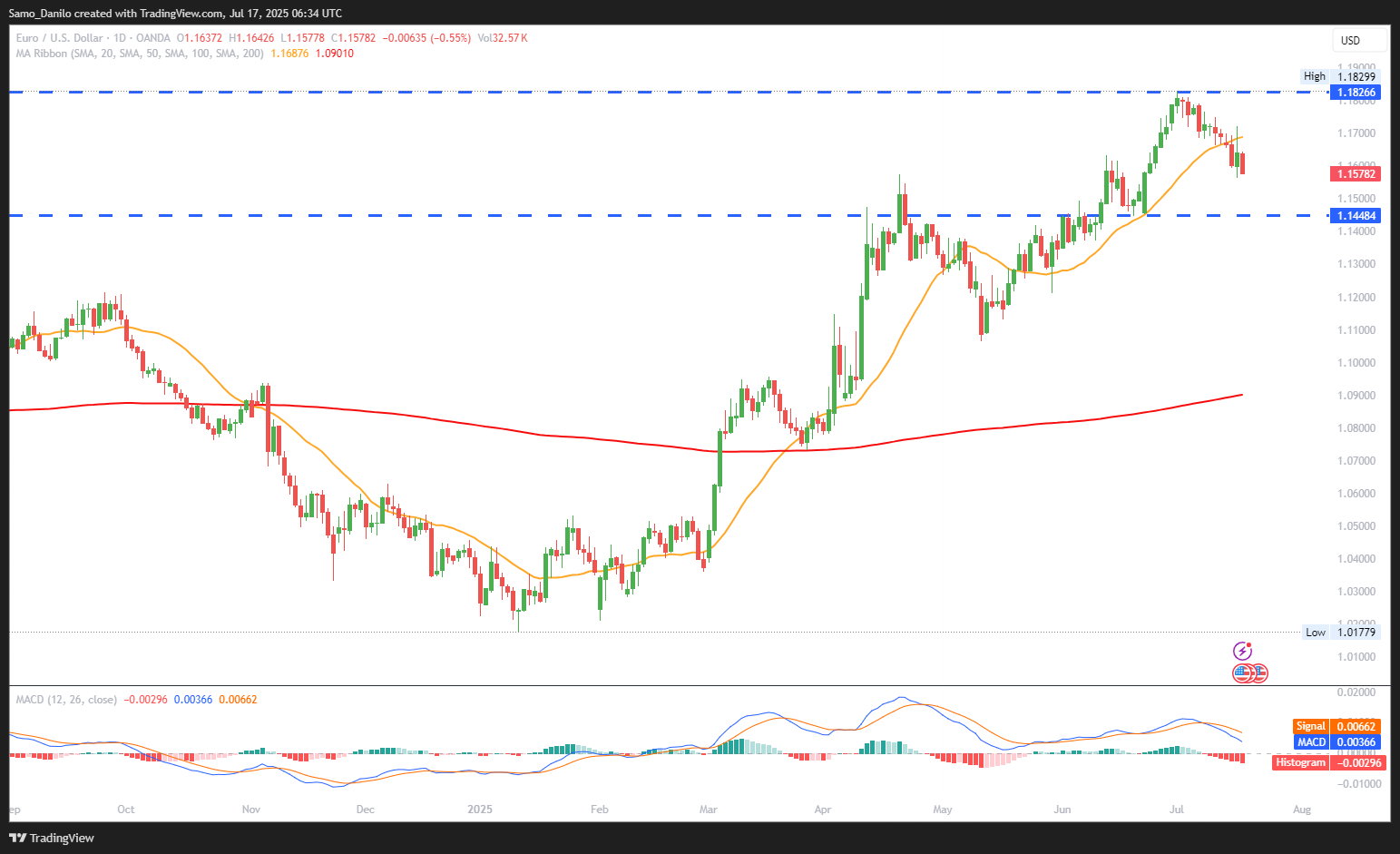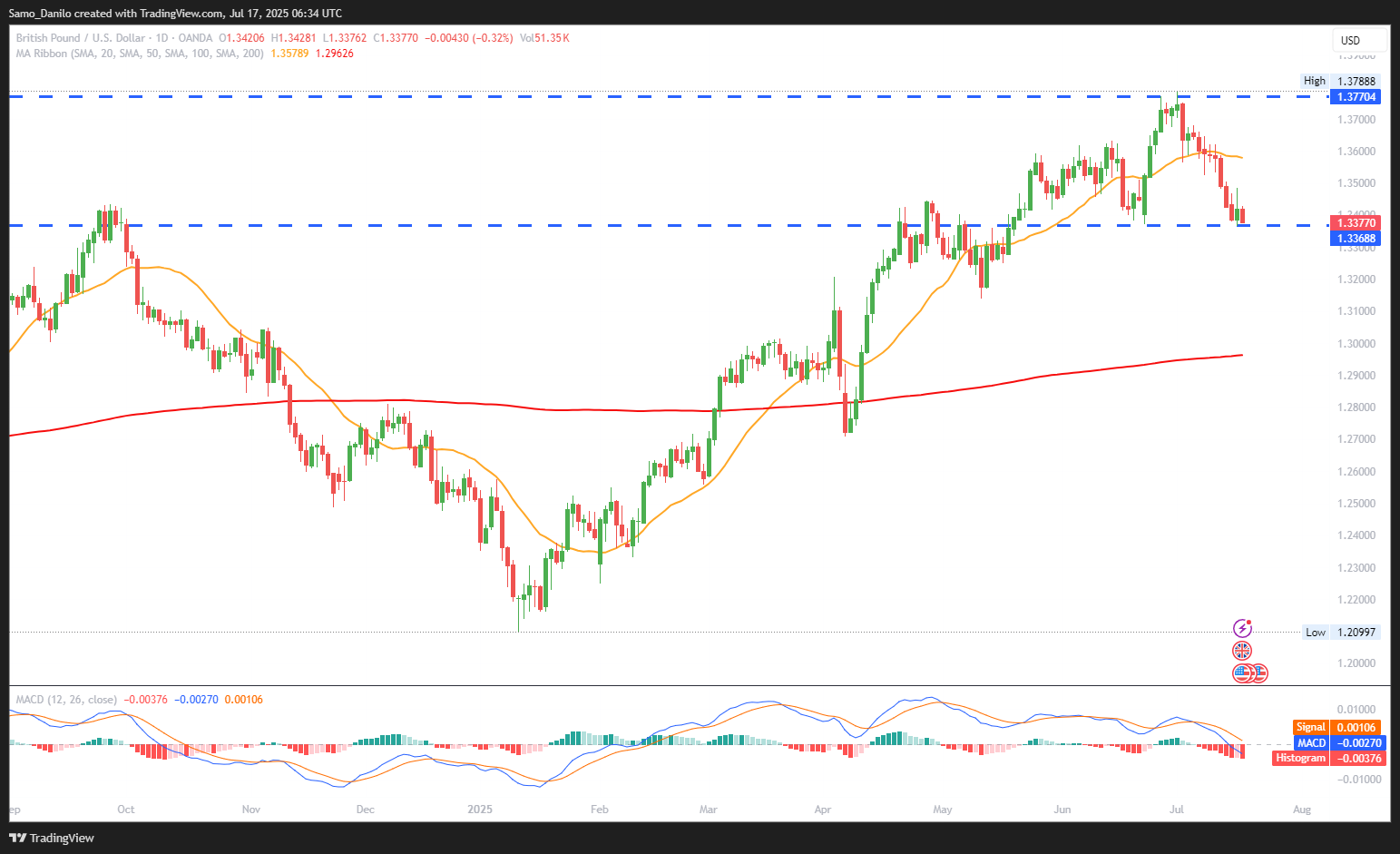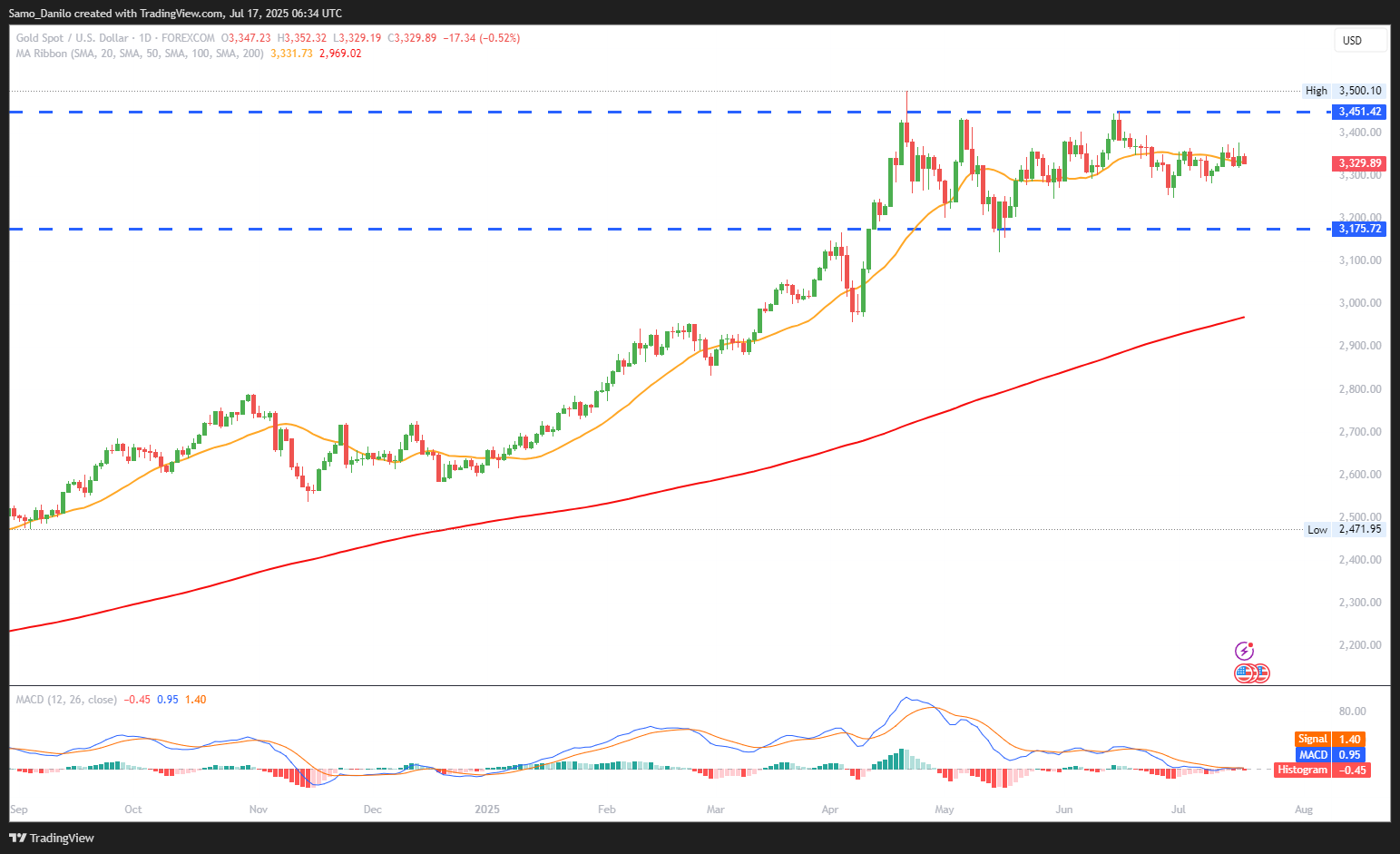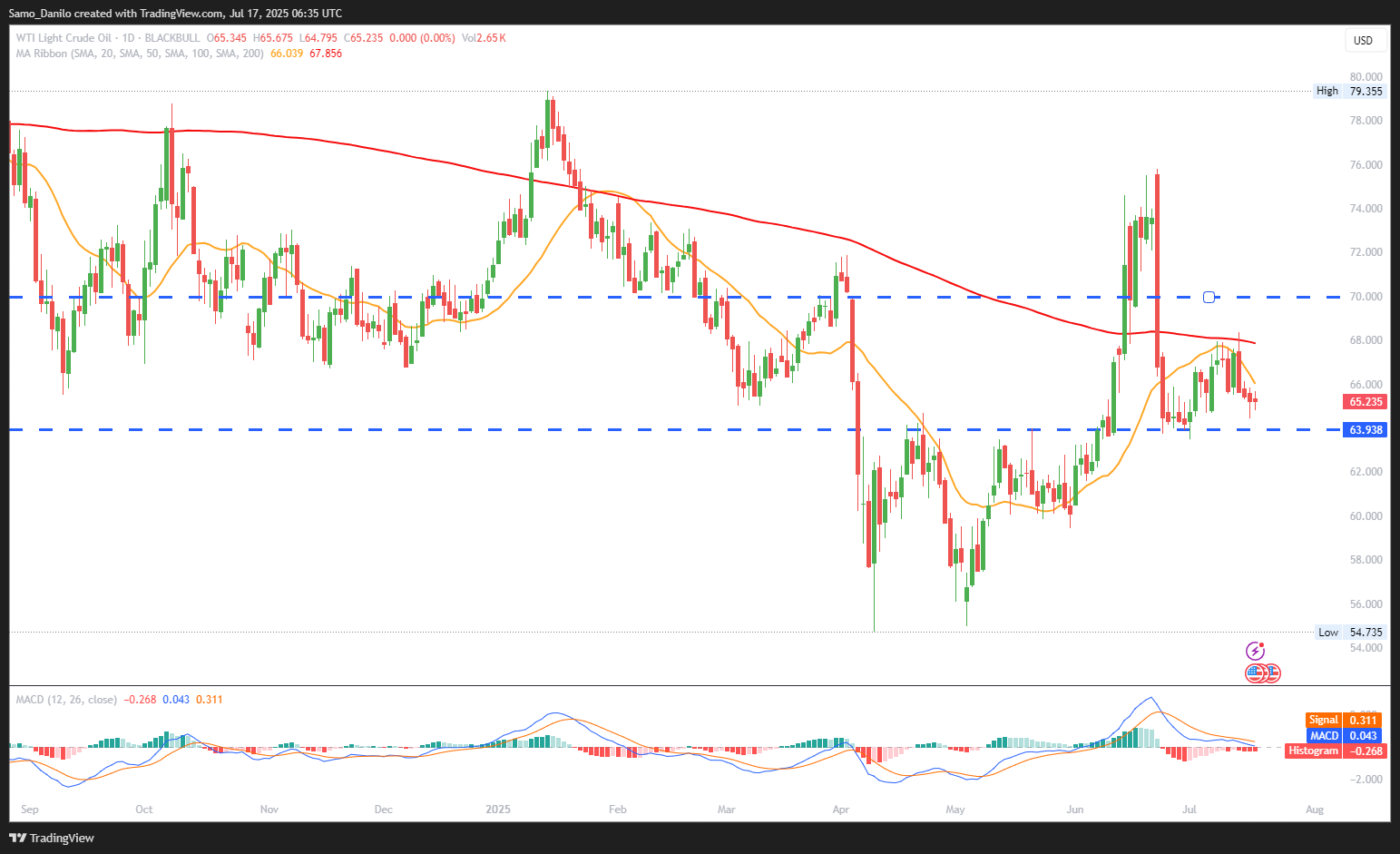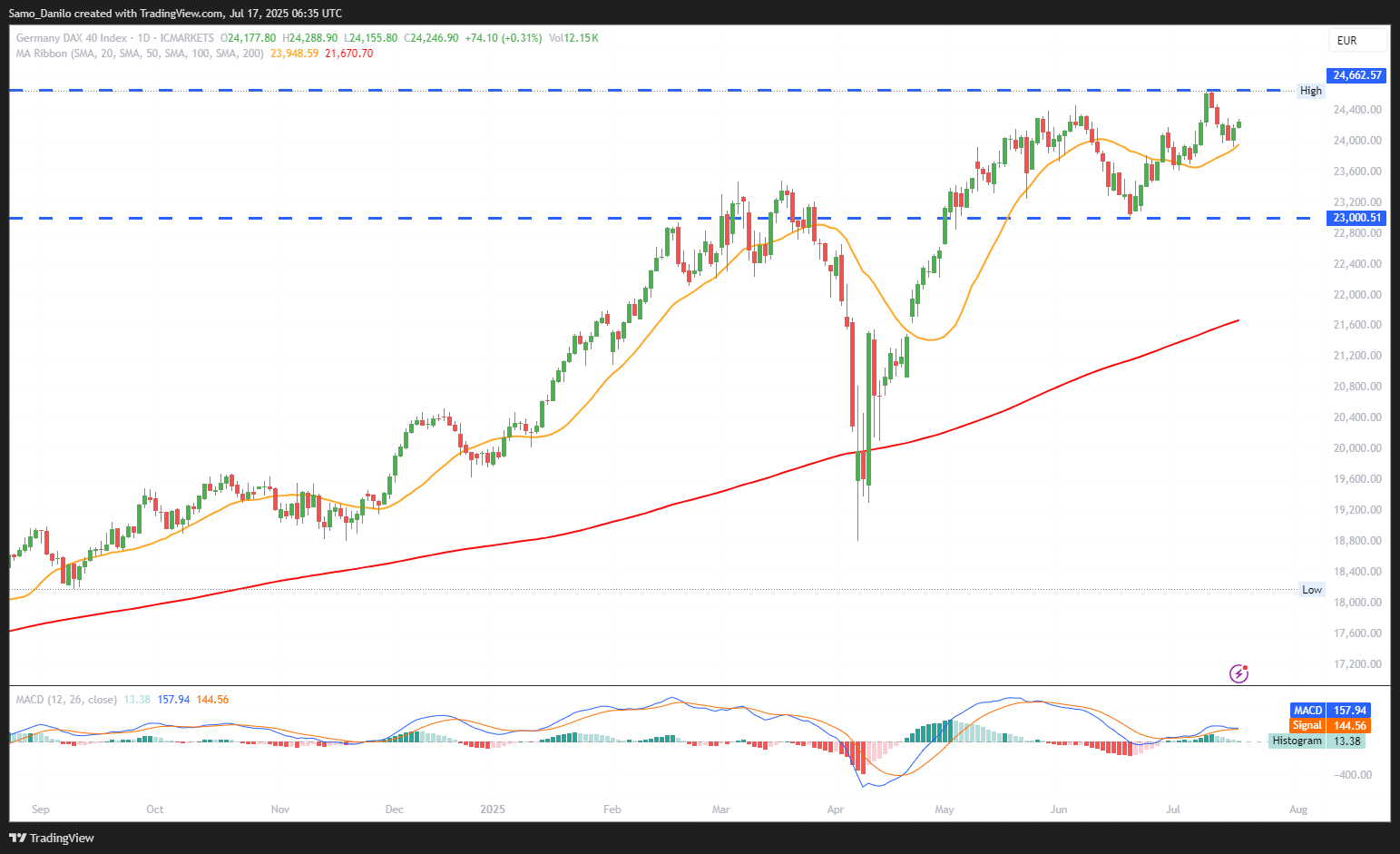EURUSD
- EUR/USD Price: The euro is trading above 1.1600 in Wednesday’s European session, benefiting from a mild pullback in the US Dollar as traders digest ongoing geopolitical and economic risks.
- EU Tariffs: The Wall Street Journal reports that the EU is preparing retaliatory tariffs worth €72 billion ($84B) on US exports—including aircraft, alcohol, and medical devices—should trade negotiations fail before the self-imposed August 1 deadline.
- Deutsche Bank Outlook: Deutsche Bank warned that early August could mirror last year’s turmoil, as a mix of trade tension, slowing growth, and market uncertainty might stoke recession fears and drive sharp risk-off moves.
- ECB’s Nagel: Bundesbank President Joachim Nagel emphasized the need for “steady-handed” policy in the face of heightened uncertainty from Trump’s tariff threats, signaling a cautious ECB stance.
- US Inflation: US inflation data showed a notable increase, particularly in imported goods, supporting the case for a longer period of higher US interest rates and potentially capping EUR/USD gains.
Closing statement: EUR/USD gains remain modest as supportive USD weakness is offset by looming US-EU trade friction and firm US inflation. Traders may stay cautious ahead of the August 1 deadline, with downside risks still prevalent.
GBPUSD
- GBP/USD Price: The GBP/USD pair remains under pressure, trading near its lowest level since May 20, as fresh US Dollar buying weighs on the British Pound during early European hours on Thursday.
- UK Inflation: UK headline CPI rose to 3.6% YoY in June, slightly above May’s 3.4%, reinforcing expectations that inflationary pressures are proving sticky despite the recent easing in global energy prices.
- UK Unemployment: Labour market data showed that ILO unemployment rose to 4.7% for the three months to May, pointing to a cooling job market, which could complicate the BoE’s monetary policy outlook.
- BoE Governor: BoE Governor Andrew Bailey’s upcoming speech in London is expected to offer signals on the central bank’s stance ahead of the August policy meeting, especially in light of the inflation-labor market mix.
- Fed’s Logan: Dallas Fed President Lorie Logan indicated that interest rates may stay elevated longer, as the central bank continues to offset inflation risks stemming from the Trump administration’s tariff policies.
Closing statement: GBP/USD remains under bearish pressure as stronger US data and cautious Fed messaging support the dollar. Rising UK inflation contrasts with weakening employment, creating uncertainty ahead of key BoE guidance.
XAUUSD
- XAU/USD Price: XAU/USD is trading above $3,330, recovering from earlier losses this week as risk appetite weakens, prompting safe-haven inflows into gold amid heightened geopolitical and trade-related concerns.
- US PPI: June’s PPI remained flat vs. expectations of a 0.2% rise, while core PPI slowed to 2.6% YoY—both softer than expected—suggesting easing inflationary pressures, which could support the case for looser monetary policy later this year.
- Fed's Powell: Fed Chair Jerome Powell reiterated a wait-and-see approach, noting that more time is needed to gauge the economic impact of Trump's trade tariffs. This dampened aggressive rate cut bets but added to safe-haven demand.
- Trump Tariffs: Trump announced new tariffs over 10% on smaller economies and confirmed a deal with Indonesia that still includes a 15% levy—reinforcing investor uncertainty and supporting defensive positioning in gold.
- Fed Beige Book: The Fed’s Beige Book noted that while growth and inflation remain stable, cost pressures are quietly building. This mix of moderate optimism and caution continues to support gold as a hedge.
Closing statement: Gold benefits from a complex macro backdrop of trade tensions, softer inflation, and Fed caution. As risk sentiment deteriorates, XAU/USD may find support, though the path forward hinges on upcoming Fed signals and tariff developments.
CRUDE OIL
- Crude Oil Price: West Texas Intermediate (WTI) is trading around $65.20 early Thursday, slipping as easing supply concerns and aggressive US trade policies offset recent inventory drawdowns.
- US Crude Inventories: The EIA reported a 3.859 million barrel decline in US crude stockpiles for the week ending July 11, partially reversing the previous week's large build of 7.07 million barrels and offering mild support to prices.
- Trump’s Tariffs: President Trump announced a 200% tariff on pharmaceutical imports by month-end and reaffirmed heavy tariffs on copper and goods from over 20 nations, heightening global trade friction and clouding demand prospects.
- Russia Deadline: Trump's 50-day ultimatum to Russia for a Ukraine peace deal, along with threats of sanctions on buyers of Russian exports, reduced fears of abrupt supply shocks, keeping oil gains in check.
- US Data: Traders await US Retail Sales, Initial Jobless Claims, and the Philly Fed Manufacturing Index later Thursday for insight into the health of US demand and potential implications for oil consumption.
Closing statement: Crude oil prices face mixed pressures—bullish from falling US inventories, but bearish from easing supply fears and growing trade tensions. Near-term direction may hinge on upcoming US macroeconomic data and geopolitical developments.
DAX
- DAX Price: Germany’s DAX index rose 0.42% on Wednesday, closing at 24,180 and continues to edge higher today, breaking a brief losing streak amid stabilizing sentiment and firm European data.
- Inflation Outlook: Analysts note that rising costs in categories like furnishings, apparel, and recreation indicate that US tariffs are gradually impacting consumer prices, reinforcing the case for a Fed pause—a sentiment that lifted global equities.
- Political Drama: President Trump’s remark that he’d like to see Powell resign, though admitting it would roil markets if he acted, added to policy uncertainty but failed to shake investor confidence significantly.
- Middle East Escalation: Ongoing violence in southern Syria, including Israeli airstrikes and militia-government clashes, added a layer of geopolitical risk but has yet to significantly disrupt market flows into European equities.
- Bundesbank Report: Germany’s Bundesbank Monthly Report projects inflation near 2% in the coming months, supporting expectations that ECB policy will remain steady, providing some footing for DAX investors.
Closing statement: The DAX continues to rally amid a mix of soft global inflation data, restrained central bank expectations, and manageable geopolitical risks. While volatility may persist, the index remains supported by cautious optimism and domestic stability.
